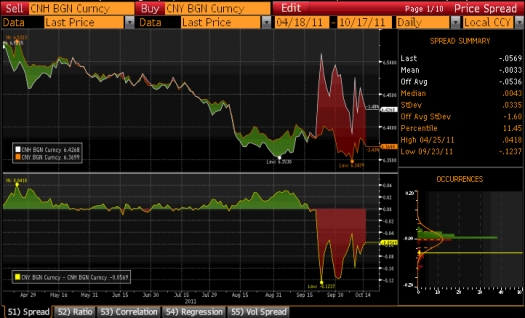Under the new rules, foreign investors will be able to make direct investments in China with renminbi legally obtained overseas. The new regulations also clear the way for foreign dim sum bond borrowers to move their proceeds into the mainland in the form of foreign direct investment (FDI), according to the central bank.
In a note published on October 14, HSBC argued that the immediate impact on USD-CNH would be limited due to the long-term nature of FDI flows.
It added that the measures would enhance the liquidity of the CNH spot market, which has come under pressure over the past month because currency positioning has been skewed, causing the spread between the onshore and offshore markets to widen.
“This is particularly timely, given how such structural weaknesses in the CNH market have been exposed by the recent imbalance in CNH supply and demand,” the report said.
| CNH – CNY Spread |
 |
| Source: Bloomberg |
Yet, it’s unlikely to result in an immediate closure of current spread between onshore-offshore RMB exchange rates, says HSBC, but it will contribute to both a more consistently liquid FX market and better balance of participants on either side of the USD-CNH trade. Typically, final demand for CNH has overwhelmingly come from investors – institutional as well as retail deposit-buyers – alongside much smaller demand from offshore importers, while supply has been predominantly from offshore exporters.
It is for this reason that when the deterioration of global sentiment resulted in a sudden drop-off of investor demand, the imbalance in supply-demand led to a sharp weakening of CNH well beyond its onshore CNY anchor, writes Daniel Hui, one of the authors of the report.
Without investors, the only other source of demand was corporate importers, who, as yet, have not increased cross-border RMB trade settlement activity sufficiently to narrow the gap, despite the attractive price of CNH relative to CNY.
The opening up of the channel should act as a pressure valve between the two markets.
“Introducing RMB FDI helps widen and broaden the overall set of RMB cross-border channels,” the report concludes. “This will structurally improve the liquidity in the CNH market, particularly during times that CNY and CNH are under pressure to diverge.”
The FDI rules are in line with an initial draft proposal published in September, except for the deletion of the prohibition of FDI funds for domestic or international refinancing purposes. Any application for RMB FDI valued at or above RMB 300 million ($47 million) must be submitted to the Ministry of Commerce for prior approval.
The announcement states that FDI in renminbi is prohibited in negotiable securities and financial derivatives. Foreign investors cannot use overseas-obtained renminbi to provide entrusted loans or to repay domestic or overseas loans.




